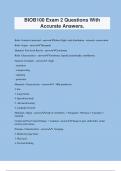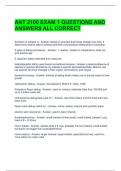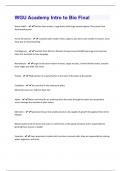Homo habilis - Study guides, Class notes & Summaries
Looking for the best study guides, study notes and summaries about Homo habilis? On this page you'll find 115 study documents about Homo habilis.
Page 4 out of 115 results
Sort by

-
AFST 235 Final Exam Actual Questions and Answers Graded A+
- Exam (elaborations) • 7 pages • 2024
- Available in package deal
-
- $11.49
- + learn more
AFST 235 Final Exam Actual Questions and Answers Graded A+ The origins of humanity lie in which of the following continents? - answerAfrica Where were the first fossils discovered(1856)- paving the way for the greater search for the "missing link"? - answerGermany Which of the following early humans were the first to make simple stone tools? - answerHomo habilis Fully modern humans appear to have evolved from where? - answerAfrica Which of the following were the first specimen to be r...

-
BIOB100 Exam 2 Questions With Accurate Answers.
- Exam (elaborations) • 9 pages • 2024
-
- $11.49
- + learn more
BIOB100 Exam 2 Questions With Accurate Answers. Birds- Scientists interested - answerRobust flight, wide distribution - research- conservation Birds- Origin - answerTheropods Mammal- First fossil Record - answerCynodontia Birds- Characteristics - answerVertebrates, bipedal, heterotrophs, endothermic Function of feathers - answer- flight - insulation - waterproofing - signaling - protection Mammals- Characteristics - answer1. Milk production 2. Fur 3. Large brains 4. Specialized tee...

-
Abeka Biology Final Exam (Chapters 1- 24) Already Passed
- Exam (elaborations) • 10 pages • 2024
- Available in package deal
-
- $9.99
- + learn more
Abeka Biology Final Exam (Chapters 1- 24) Already Passed Deciduous Trees that lose their leaves each fall Xylem The tissue that transports water and dissolved minerals upward from the roots Stamen The organs that produces pollen Osmosis The one-way diffusion through a semipermeable membrane Kingdom, phylum, class, order, family, genus, species The order of classification Epidermis The part of the skin that is exposed to the environment Louis Pasteur His experiments showed...

-
ANT 100 - Intro to Anthropology Top Questions and CORRECT Answers
- Exam (elaborations) • 11 pages • 2024
-
- $7.99
- + learn more
What is the name of the stone tool technology created by early hominins during the Lower Paleolithic that was the first bifacial and high standardized tool in early human history? (Hint: the Swiss Army knife of the Paleolithic) - Acheulean If a core is being worked by hitting an implement of wood, antler, bone, or stone with a hammerstone, what technique is being used? - Indirect Percussion Which of the following is not a step in the process of domestication? - All of the above. Match t...

-
Anthropology Final-ANT 100 Lacquament Exam Questions and Answers 100% Pass
- Exam (elaborations) • 14 pages • 2024
- Available in package deal
-
- $12.49
- + learn more
Anthropology Final-ANT 100 Lacquament Exam Questions and Answers 100% Pass _ consists of traditions and customs, transmitted through learning, that form and guide the beliefs and behavior of a group of people. - Answer- Culture Cultural Anthropology - Answer- Study of human society and culture Archaeology - Answer- Study of human behavior through material remains Biological Anthropology - Answer- Study of human biological variation through time and as it exists today linguistics - Answer...

-
ANT 2100 EXAM 1 QUESTIONS AND ANSWERS ALL CORRECT
- Exam (elaborations) • 4 pages • 2024
- Available in package deal
-
- $11.49
- + learn more
ANT 2100 EXAM 1 QUESTIONS AND ANSWERS ALL CORRECT Seriation of artifacts is - Answer- based on principle that things change over time. It determines relative date of artifacts and their chronological relationship to eachother 2 types of dating techniques: - Answer- 1. relative - based on comparisons, does not give precise age 2. absolute: dates calibrated and measured biostratigraphic dating uses faunal correlations because - Answer- presence/absence of species or species abundance ...

-
Test Bank for an Introduction to Brain and Behavior 5th Edition Bryan Kolb
- Exam (elaborations) • 163 pages • 2023
-
- $18.49
- + learn more
Test Bank for an Introduction to Brain and Behavior 5th Edition Bryan Kolb 1. Brain abnormalities can be related to: A) B) C) D) 500 disorders. 1000 disorders. 1500 disorders. more than 2,000 disorders. 2. All the nerve processes radiating out beyond the brain and spinal cord as well as all the neurons outside the brain and spinal cord constitute the: A) B) C) D) nervous system. central nervous system. peripheral nervous system. external nervous system. 3. Which is NOT part of the peripher...

-
ANT 100 - Intro to Anthropology Exam Questions and Answers 100% Pass
- Exam (elaborations) • 12 pages • 2024
- Available in package deal
-
- $12.49
- + learn more
ANT 100 - Intro to Anthropology Exam Questions and Answers 100% Pass What is the name of the stone tool technology created by early hominins during the Lower Paleolithic that was the first bifacial and high standardized tool in early human history? (Hint: the Swiss Army knife of the Paleolithic) - Answer- Acheulean If a core is being worked by hitting an implement of wood, antler, bone, or stone with a hammerstone, what technique is being used? - Answer- Indirect Percussion Which of the f...

-
History of CIV 1, Chapter 1 Practice Exam Questions Correctly Answered.
- Exam (elaborations) • 13 pages • 2024
- Available in package deal
-
- $11.49
- + learn more
History of CIV 1, Chapter 1 Practice Exam Questions Correctly Answered. c - CORRECT ANSWER How is the term species generally defined? A)a group of organisms that live together B)a group of homosapiens C)A group of organisms that can mate and produce fertile offspring of both sexes D)your mom b - CORRECT ANSWER During which of the following periods did the ancestor common to both chimpanzees and humans probably live? A)3 to 5 million years ago B)5 to 7 million years ago C)10 to 12 ...

-
WGU Academy Intro to Bio Final with complete solution graded A+
- Exam (elaborations) • 10 pages • 2023
- Available in package deal
-
- $5.49
- + learn more
Homo habilis - Shorter than modern. Large brains with large speech regions. They came from Australopithecines Homo floresiensis - coexisted with modern homo sapiens, but were much smaller in stature, most likely due to island dwarfing. Cro-Magnons - traveled from Africa to Western Europe around 40,000 years ago and may have been first hominids to have language Neandertals - larger brains than modern humans, larger muscles, shorter/thicker bones, massive brow ridges and wide, flat noses P...

Study stress? For sellers on Stuvia, these are actually golden times. KA-CHING! Earn from your study resources too and start uploading now. Discover all about earning on Stuvia


